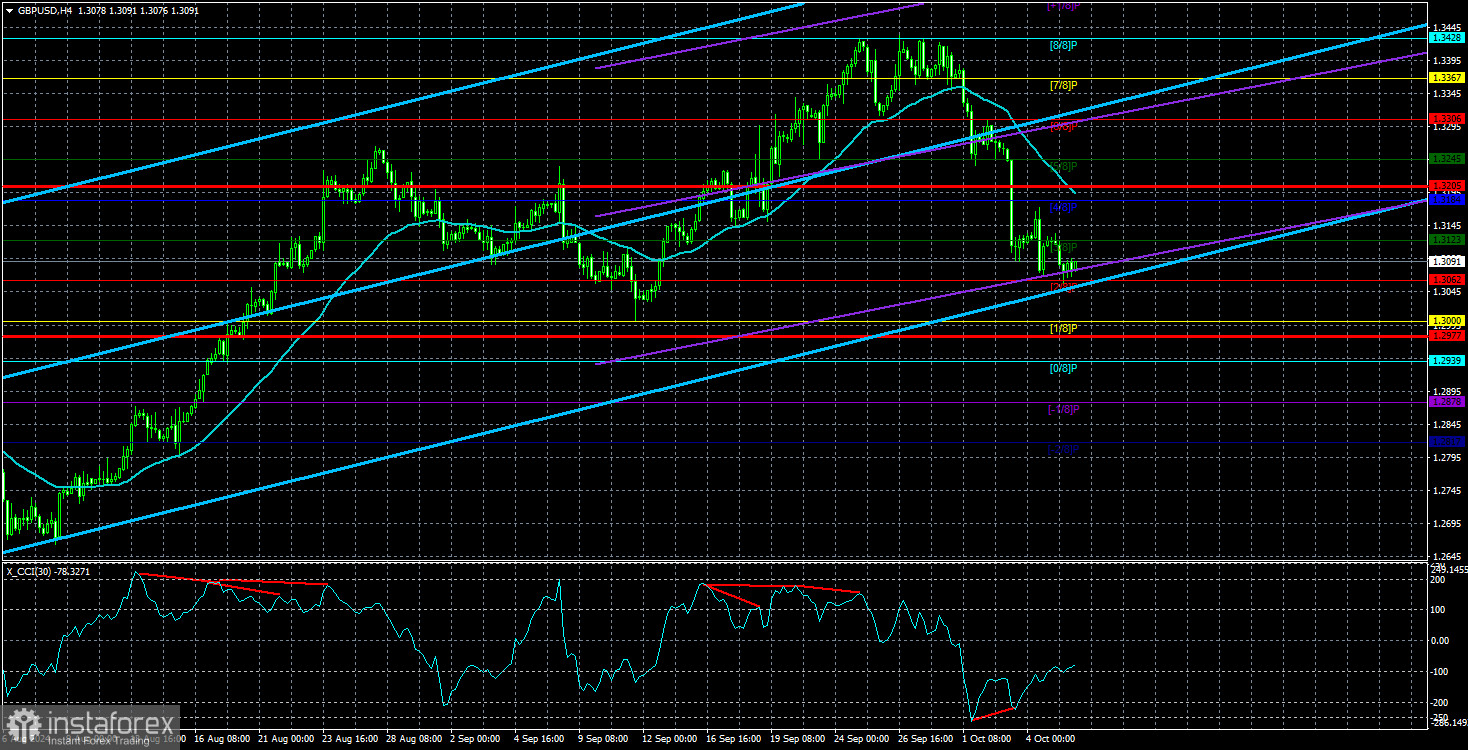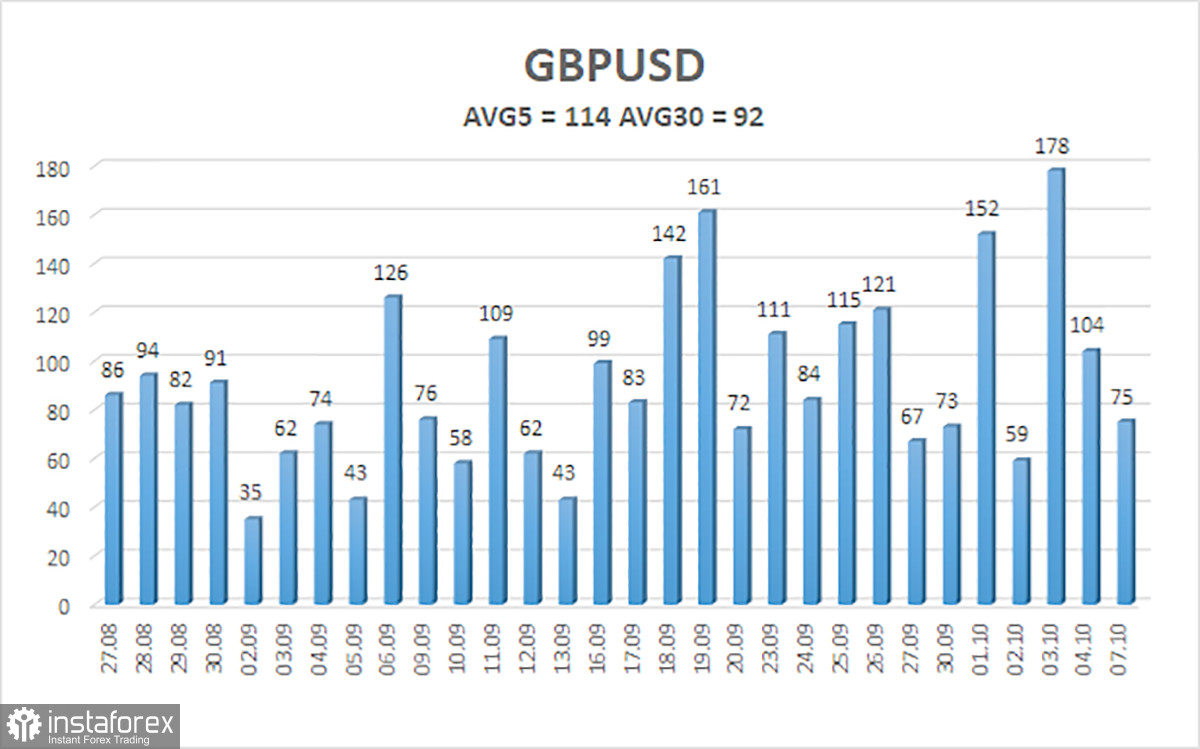
On Tuesday, the GBP/USD currency pair showed no urgency in its movement. There was a lack of fundamental and macroeconomic background, and the market hesitated to make trading decisions ahead of the U.S. inflation report. We've mentioned before that certain analysts and experts somewhat overvalue this report at this time. A few months ago, any deviation from the forecast by 0.1% would provoke a stronger reaction from traders than a meeting of the Federal Reserve or the Bank of England. Back then, market participants did not know when the monetary easing would begin in the UK and the U.S. or how fast it would be. It's clear that the Fed will reduce rates at every meeting until the end of the year, and the market has already priced in the most dovish scenario. Therefore, the U.S. dollar no longer has reasons to fall. But at the same time, there are also no reasons for the pound sterling to fall, as the BoE might only cut the key rate once more by the end of the year.
Problems in the British economy are clearly visible, so a lower rate would benefit it. However, inflation in the UK has started to accelerate again, and within the BoE, there is an expectation that it will rise to 2.8% year-on-year in the coming months. The results of a survey conducted by the British central bank among companies were also discouraging. The data showed that expected inflation in September is 2.6%. The survey results also revealed declining business uncertainty and unchanged wage growth rates. However, what matters most to us is inflation. If inflation continues to rise in the near future, the BoE will have no reason to lower the key rate. This factor could support the British currency, which has been rising for two years without apparent reason but now finds additional backing.
There are currently no technical reasons to expect a new rise in the pair. In the 4-hour time frame, the price is below the moving average line, and in the daily time frame, it is below the critical line. Therefore, further decline is possible. The market will now be trading based on the most important reports on inflation and the U.S. labor market, and such reports are published at best once a week. That said, we cannot entirely rule out the possibility of the British currency returning to its groundless growth. The BoE's policy seems to support the pound, but in the past two years, such support has been rare compared to the pound's growth. Therefore, the pound remains overbought, though, on the daily time frame, the uptrend appears to be continuing rather than a downtrend beginning. So far, the price has yet to reach the nearest local low. Thus, we are waiting for the inflation report, which could help the pair either start an upward correction or break through the September 11 low.

The average volatility of the GBP/USD pair over the last five trading days is 93 pips. For the pound/dollar pair, this is considered "average" volatility. Therefore, on Wednesday, October 9, we expect movement within a range of 1.2992 and 1.3178. The higher linear regression channel is directed upward, signaling the continuation of the upward trend. The CCI indicator formed six bearish divergences before any significant decline occurred. The indicator has entered the oversold area and formed a bullish divergence, indicating a possible upward correction.
Nearest Support Levels:
- S1 – 1.3062
- S2 – 1.3000
- S3 – 1.2939
Nearest Resistance Levels:
- R1 – 1.3123
- R2 – 1.3184
- R3 – 1.3245
Trading Recommendations:
The GBP/USD currency pair has finally settled below the moving average and started a significant decline. We are still not considering long positions, as we believe that all growth factors for the British currency have already been priced in by the market several times. However, it would be unwise to rule out the possibility that the pound could continue rising for a while due to momentum. Therefore, if you trade based on pure technical analysis, long positions are possible with targets at 1.3306 and 1.3367 if the price is above the moving average. Short positions are much more relevant now, with targets at 1.3000 and 1.2992.
Explanation of the Illustrations:
Linear regression channels: help determine the current trend. If both channels point in the same direction, it indicates a strong trend.
Moving average line (settings 20,0, smoothed): determines the short-term trend and the direction in which to trade.
Murray levels: target levels for movements and corrections.
Volatility levels (red lines): the probable price range the pair will trade over the next 24 hours, based on current volatility indicators.
CCI Indicator: entering the oversold area (below -250) or the overbought area (above +250) signals an imminent trend reversal in the opposite direction.
 English
English 
 Русский
Русский Bahasa Indonesia
Bahasa Indonesia Bahasa Malay
Bahasa Malay ไทย
ไทย Español
Español Deutsch
Deutsch Български
Български Français
Français Tiếng Việt
Tiếng Việt 中文
中文 বাংলা
বাংলা हिन्दी
हिन्दी Čeština
Čeština Українська
Українська Română
Română

